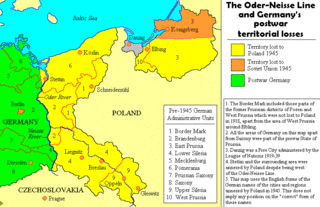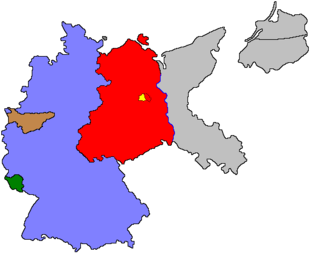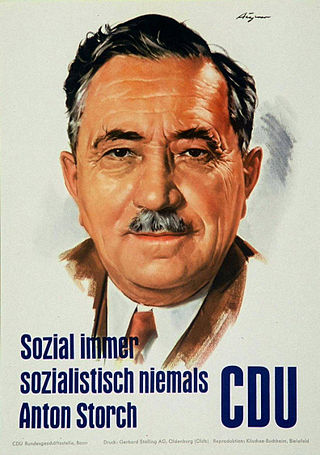
The Supreme Soviet of the Union of Soviet Socialist Republics was, from 1936 to 1991, the highest body of state authority of the Union of Soviet Socialist Republics (USSR), and based on the principle of unified power was the only branch of government in the Soviet state.

West Germany is the common English name for the Federal Republic of Germany (FRG) from its formation on 23 May 1949 until the reunification with East Germany on 3 October 1990. During the Cold War, the western portion of Germany and the associated territory of West Berlin were parts of the Western Bloc. West Germany was formed as a political entity during the Allied occupation of Germany after World War II, established from 12 states formed in the three Allied zones of occupation held by the United States, the United Kingdom, and France. The capital was the city of Bonn, hence the Cold War-era country is sometimes known as the Bonn Republic.

Ludwig Wilhelm Erhard was a German politician and economist affiliated with the Christian Democratic Union (CDU), and chancellor of West Germany from 1963 until 1966. He is known for leading the West German postwar economic reforms and economic recovery in his role as Minister of Economic Affairs under Chancellor Konrad Adenauer from 1949 to 1963. During that period he promoted the concept of the social market economy, on which Germany's economic policy in the 21st century continues to be based. In his tenure as Chancellor, however, Erhard lacked support from Adenauer, who remained chairman of the party until 1966, and failed to win the public's confidence in his handling of a budget deficit and his direction of foreign policy. His popularity waned, and he resigned his chancellorship on 30 November 1966.

The German Bundesrat is a legislative body that represents the sixteen Länder of Germany at the federal level. The Bundesrat meets at the former Prussian House of Lords in Berlin. Its second seat is located in the former West German capital of Bonn.

Dr. Erhard Hübener was a German politician and member of the German Democratic Party (DDP) until 1933. After World War II he engaged in rebuilding structures of self-rule in the Soviet occupation zone and was a co-founder and member of the Liberal Democratic Party of Germany (LDPD).

The Polish Workers' Party was a communist party in Poland from 1942 to 1948. It was founded as a reconstitution of the Communist Party of Poland (KPP) and merged with the Polish Socialist Party (PPS) in 1948 to form the Polish United Workers' Party (PZPR). From the end of World War II the PPR led Poland, with the Soviet Union exercising moderate influence. During the PPR years, the centers of opposition activity were largely diminished, and a socialist system was established in the country.

The Bizone or Bizonia was the combination of the American and the British occupation zones on 1 January 1947 during the occupation of Germany after World War II. With the addition of the French occupation zone on 1 August 1948 the entity became the Trizone. Later, on 23 May 1949, the Trizone became the Federal Republic of Germany, commonly known as West Germany.

The Zionist Congress was established in 1897 by Theodor Herzl as the supreme organ of the Zionist Organization (ZO) and its legislative authority. In 1960 the names were changed to World Zionist Congress and World Zionist Organization (WZO), respectively. The World Zionist Organization elects the officers and decides on the policies of the WZO and the Jewish Agency, including "determining the allocation of funds." The first Zionist Congress was held in Basel, Switzerland in 1897. Any Jew over age 18 who belongs to a Zionist association is eligible to vote, and the number of elected delegates to the Congress is 500. 38% of the delegates are allocated to Israel, 29% to the United States of America, and 33% to the remainder of the countries of the Diaspora. In addition there are about 100 delegates which are appointed by International Organizations affiliated with WZO.
Reichspost was the name of the postal service of Germany from 1866 to 1945.

The reconstruction of Germany was a long process of rebuilding Germany after the destruction endured during World War II. Germany suffered heavy losses during the war, both in lives and industrial power. 6.9 to 7.5 million Germans died, roughly 8.26% to 8.86% of the population. The country's cities were severely damaged from heavy bombing in the closing chapters of the war and agricultural production was only 35% of what it was before the war.

The entirety of Germany was occupied and administered by the Allies of World War II from the Berlin Declaration on 5 June 1945 to the establishment of West Germany on 23 May 1949. Unlike occupied Japan, Germany was stripped of its sovereignty and former state: after Nazi Germany surrendered on 8 May 1945, four countries representing the Allies asserted joint authority and sovereignty through the Allied Control Council (ACC). At first, Allied-occupied Germany was defined as all territories of Germany before the 1938 Nazi annexation of Austria; the Potsdam Agreement on 2 August 1945 defined the new eastern German border by giving Poland and the Soviet Union all regions of Germany east of the Oder–Neisse line and divided the remaining "Germany as a whole" into four occupation zones, each administered by one of the Allies.

The Government of Türkiye is the national government of Türkiye. It is governed as a unitary state under a presidential representative democracy and a constitutional republic within a pluriform multi-party system. The term government can mean either the collective set of institutions or specifically the Cabinet.

The IG Farben Building – also known as the Poelzig Building and the Abrams Building, formerly informally called The Pentagon of Europe – is a building complex in Frankfurt, Germany, which currently serves as the main structure of the Westend Campus of the University of Frankfurt. Construction began in 1928 and was complete in 1930 as the corporate headquarters of the IG Farben conglomerate, then the world's largest chemical company and the world's fourth-largest company overall.

The industrial plans for Germany were designs the Allies of World War II considered imposing on Germany in the Aftermath of World War II to reduce and manage Germany's industrial capacity.

The Allied Control Council (ACC) or Allied Control Authority, and also referred to as the Four Powers, was the governing body of the Allied occupation zones in Germany (1945–1949/1991) and Austria (1945–1955) after the end of World War II in Europe. After the defeat of the Nazis, Germany and Austria were occupied as two different areas, both by the same four Allies. Both were later divided into four zones by the 1 August 1945 Potsdam Agreement. Its members were the Soviet Union, the United Kingdom, the United States, and France. The organisation was based in Schöneberg, Berlin.

The German Economic Commission was the top administrative body in the Soviet Occupation Zone of Germany prior to the creation of the German Democratic Republic.

The German Party was a national-conservative political party in West Germany active during the post-war years. The party's ideology appealed to sentiments of German nationalism and nostalgia for the German Empire.

Anton Storch was a German trade unionist, politician, a member of the Christian Democratic Union (CDU) and the minister of labor from 1949 to 1957.
The Economic Council is a major German business and lobby association representing the interests of around 12,000 members and member firms. Members are drawn from all sectors of the German economy including banking and finance, insurance, the automotive and chemical industries, healthcare and high-tech.
Primary legislation and secondary legislation are two forms of law, created respectively by the legislative and executive branches of governments in representative democracies. Primary legislation generally consists of statutes, also known as 'acts', that set out broad principles and rules, but may delegate specific authority to an executive branch to make more specific laws under the aegis of the principal act. The executive branch can then issue secondary legislation, creating legally enforceable regulations and the procedures for implementing them.

















